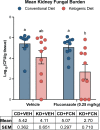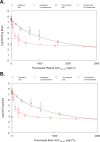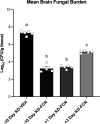A ketogenic diet enhances fluconazole efficacy in murine models of systemic fungal infection
- PMID: 38619236
- PMCID: PMC11077957
- DOI: 10.1128/mbio.00649-24
A ketogenic diet enhances fluconazole efficacy in murine models of systemic fungal infection
Abstract
Invasive fungal infections are a significant public health concern, with mortality rates ranging from 20% to 85% despite current treatments. Therefore, we examined whether a ketogenic diet could serve as a successful treatment intervention in murine models of Cryptococcus neoformans and Candida albicans infection in combination with fluconazole-a low-cost, readily available antifungal therapy. The ketogenic diet is a high-fat, low-carbohydrate diet that promotes fatty acid oxidation as an alternative to glycolysis through the production of ketone bodies. In this series of experiments, mice fed a ketogenic diet prior to infection with C. neoformans and treated with fluconazole had a significant decrease in fungal burden in both the brain (mean 2.66 ± 0.289 log10 reduction) and lung (mean 1.72 ± 0.399 log10 reduction) compared to fluconazole treatment on a conventional diet. During C. albicans infection, kidney fungal burden of mice in the keto-fluconazole combination group was significantly decreased compared to fluconazole alone (2.37 ± 0.770 log10-reduction). Along with higher concentrations of fluconazole in the plasma and brain tissue, fluconazole efficacy was maximized at a significantly lower concentration on a keto diet compared to a conventional diet, indicating a dramatic effect on fluconazole pharmacodynamics. Our findings indicate that a ketogenic diet potentiates the effect of fluconazole at multiple body sites during both C. neoformans and C. albicans infection and could have practical and promising treatment implications.IMPORTANCEInvasive fungal infections cause over 2.5 million deaths per year around the world. Treatments for fungal infections are limited, and there is a significant need to develop strategies to enhance antifungal efficacy, combat antifungal resistance, and mitigate treatment side effects. We determined that a high-fat, low-carbohydrate ketogenic diet significantly potentiated the therapeutic effect of fluconazole, which resulted in a substantial decrease in tissue fungal burden of both C. neoformans and C. albicans in experimental animal models. We believe this work is the first of its kind to demonstrate that diet can dramatically influence the treatment of fungal infections. These results highlight a novel strategy of antifungal drug enhancement and emphasize the need for future investigation into dietary effects on antifungal drug activity.
Keywords: Candida; Cryptococcus; cryptococcal meningitis; fluconazole; ketogenic diet.
Conflict of interest statement
J.R.P. received grants/consulting support from Appili, Pfizer, Matinas, Cidara, Scynexis, and F2G. C.D.G. received past salary support from projects funded by Appili, Astellas, Amplyx, Interventional Analgesix, Minnetronix, Pfizer, and Sfunga Therapeutics. He owns common stock totaling less than $5,000 of the following: GSK, Actinium, Nkarta, and Bristol Myers Squibb. W.H. holds or has recently held research grants with UKRI, EU (FP7, IMI-1, and IMI-2), Wellcome, F2G, Spero Therapeutics, Antabio, Pfizer, Allecra, Bugworks, Phico Therapeutics, BioVersys, and Global Antimicrobial Research and Development Partnership (GARDP). He is (or has recently been) a consultant for Appili Therapeutics, F2G, Spero Therapeutics, Pfizer, GSK, Phico Therapeutics, Pulmocide, and Mundipharma Research Ltd. He was a member of the Specialist Advisory Committee for GARDP (2020–2023), a member of the British Society for Antimicrobial Chemotherapy Breakpoint Committee (2020–2023), and a member of NIHR Health Technology Appraisal (HTA) Prioritisation Committee for hospital care and is the Specialty National Co-lead for Infection for the National Institute of Health Research (NIHR) (2020–current).
Figures







Similar articles
-
Synergistic and antagonistic drug interactions in the treatment of systemic fungal infections.Elife. 2020 May 5;9:e54160. doi: 10.7554/eLife.54160. Elife. 2020. PMID: 32367801 Free PMC article.
-
In Vitro and In Vivo Evaluation of APX001A/APX001 and Other Gwt1 Inhibitors against Cryptococcus.Antimicrob Agents Chemother. 2018 Jul 27;62(8):e00523-18. doi: 10.1128/AAC.00523-18. Print 2018 Aug. Antimicrob Agents Chemother. 2018. PMID: 29891599 Free PMC article.
-
New Triazole NT-a9 Has Potent Antifungal Efficacy against Cryptococcus neoformans In Vitro and In Vivo.Antimicrob Agents Chemother. 2020 Jan 27;64(2):e01628-19. doi: 10.1128/AAC.01628-19. Print 2020 Jan 27. Antimicrob Agents Chemother. 2020. PMID: 31791946 Free PMC article.
-
Susceptibility of Candida albicans and other yeasts to fluconazole: relation between in vitro and in vivo studies.Rev Infect Dis. 1990 Mar-Apr;12 Suppl 3:S272-5. doi: 10.1093/clinids/12.supplement_3.s272. Rev Infect Dis. 1990. PMID: 2184504 Review.
-
Fluconazole therapy for experimental cryptococcosis and candidiasis in the rabbit.Rev Infect Dis. 1990 Mar-Apr;12 Suppl 3:S299-302. doi: 10.1093/clinids/12.supplement_3.s299. Rev Infect Dis. 1990. PMID: 2184508 Review.
Cited by
-
Cryptococcal nutrient acquisition and pathogenesis: dining on the host.Microbiol Mol Biol Rev. 2025 Mar 27;89(1):e0001523. doi: 10.1128/mmbr.00015-23. Epub 2025 Feb 10. Microbiol Mol Biol Rev. 2025. PMID: 39927764 Review.
-
Metabolic homeostasis in fungal infections from the perspective of pathogens, immune cells, and whole-body systems.Microbiol Mol Biol Rev. 2024 Sep 26;88(3):e0017122. doi: 10.1128/mmbr.00171-22. Epub 2024 Sep 4. Microbiol Mol Biol Rev. 2024. PMID: 39230301 Review.
-
Gut Mycobiome: Latest Findings and Current Knowledge Regarding Its Significance in Human Health and Disease.J Fungi (Basel). 2025 Apr 22;11(5):333. doi: 10.3390/jof11050333. J Fungi (Basel). 2025. PMID: 40422666 Free PMC article. Review.
References
-
- World Health Organization . 2022. WHO fungal priority pathogens list to guide research, development and public health action. Geneva
-
- Dobiáš R, Havlíček V. 2020. Microbial siderophores: markers of infectious diseases, p 57–72. Academic Press.
Publication types
MeSH terms
Substances
Grants and funding
LinkOut - more resources
Full Text Sources
Medical

